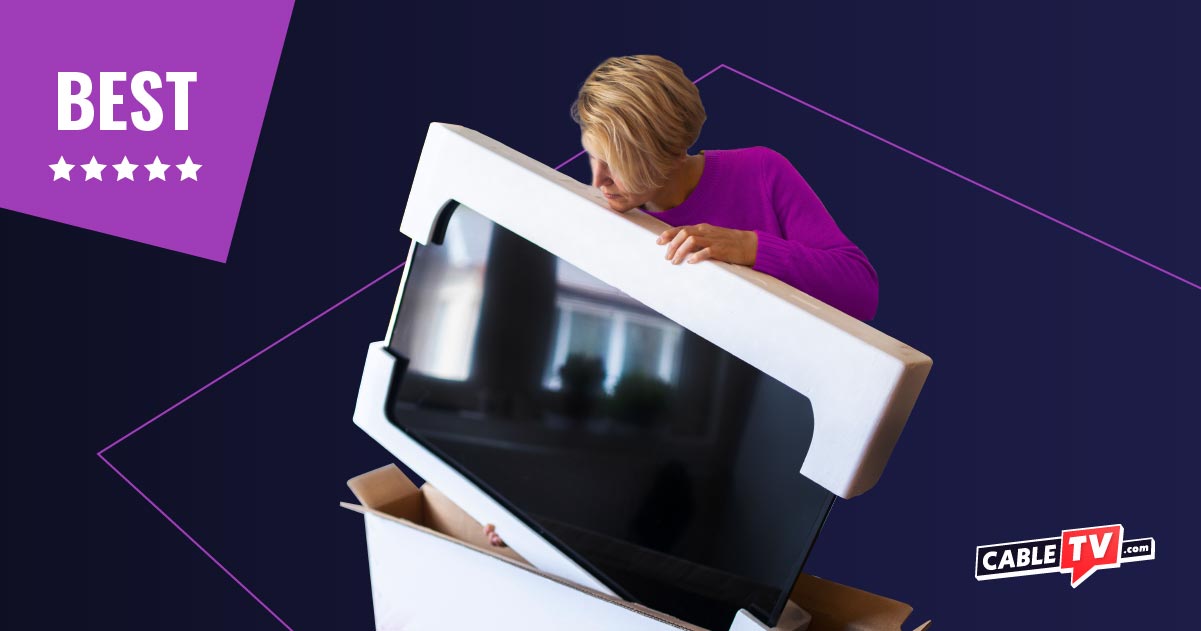We review TV providers, so you don’t have to
TV is life here at CableTV.com, and knowing the pros and cons of each major TV provider is our lifeblood. Read some reviews, switch to a better provider … bada bing, bada boom!
Our TV experts scour the internet for deals
Good TV doesn’t come cheap. Or does it? We regularly update our content with the latest pricing and deals to help you with your budget.
CableTV.com wants you to live your best life on the couch. And if you’re gonna do that, you need to know which TV provider is the best for your lifestyle and needs.
These offerings are among the best TV has to offer, but they’re not exactly cheap. But if you invest in one of these prime offerings, be ready to change your TV experience forever.
Looking to save some money? We’ve compiled the best cheap TV plans to help reduce your bill without sacrificing entertainment altogether.
Comparing TV providers has never been easier
Saying a brand is good, or a brand sucks is one thing. But comparing their deets head to head will give you a clearer picture of your options.
| Provider | Max channel count | Tech type | Details |
|---|---|---|---|
| Astound Broadband | 304+ | Cable | View plans |
| Cox | 250+ | Cable | View plans |
| DIRECTV | 340+ | Satellite | View plans |
| DISH | 290+ | Satellite | View plans |
| Mediacom | 170+ | Cable | View plans |
| Optimum | 420+ | Cable | View plans |
| Spectrum | 150+ | Cable | Check Availability |
| Sparklight (CABLE ONE) | 100+ | Cable | View plans |
| Verizon Fios | 425+ | Fiber | View plans |
| Xfinity | 185+ | Cable | View plans |
No-holds-barred, head-to-head comparisons
We know that there are only so many TV providers available in your area. We put national brands in head-to-head matchups with their direct competitors (and don’t pull any punches), so you get the line on your best bet for TV in your neighborhood.
Every channel lineup is unique like a snowflake
It’s well known that TV providers like to play God with our entertainment, and a lot of plans won’t have your favorite channels, shows, and movies. That’s why it’s important to know your channel lineup before you buy.

We love reviewing streaming services, too
We’ve seen it in the cards: streaming is the future of TV. Okay, so it doesn’t take a genius to figure that out at this point. In fact, most of us over here at CableTV.com choose live TV streaming over traditional cable. Read our reviews and see why.
We nerd out on the latest TV gadgets
What good is an amazing TV package without the right equipment? Whether you’re looking to upgrade your saggy plasma TV or move primetime out to your patio, we got you.
We’re here to help you learn what to look for in a TV so that once you’ve got it set up, all you need to worry about is which show to watch first.
We’ve compared several new smart TVs, considering these questions and more, and found four to recommend to you.
Don't settle for a tiny laptop or smartphone screen when you're unwinding with shows and movies after a long day of classes. Here are our top student TV recommendations.
Do you love TV but don’t have a schedule that lets you watch your favorite shows when they air? With the recording and storage power of a good DVR, you can keep up with everything you like to watch.
When it comes to sound systems, there are a lot of options. From simple soundbars to eight-speaker setups, there’s something to suit every living room and budget.
For maximum cool factor and a superclean look for your entertainment center, mounting your flat-panel TV is the way to go. Here’s how to get that TV on the wall.
Ready to watch great TV?
Whether you go for good ole cable TV, satellite TV, or new streaming TV services, we’re here to help you find providers in your area and get the right plan for you.
All you have to do is enter your zip code below to get started.

























